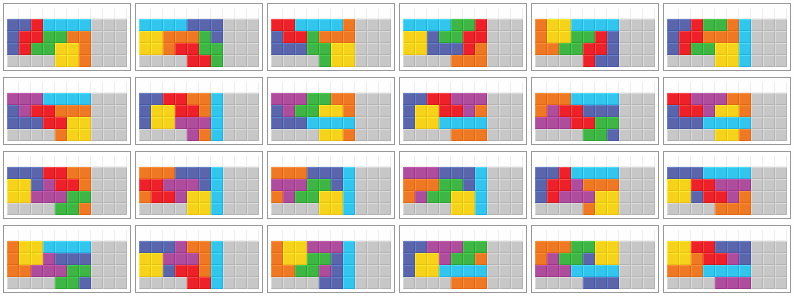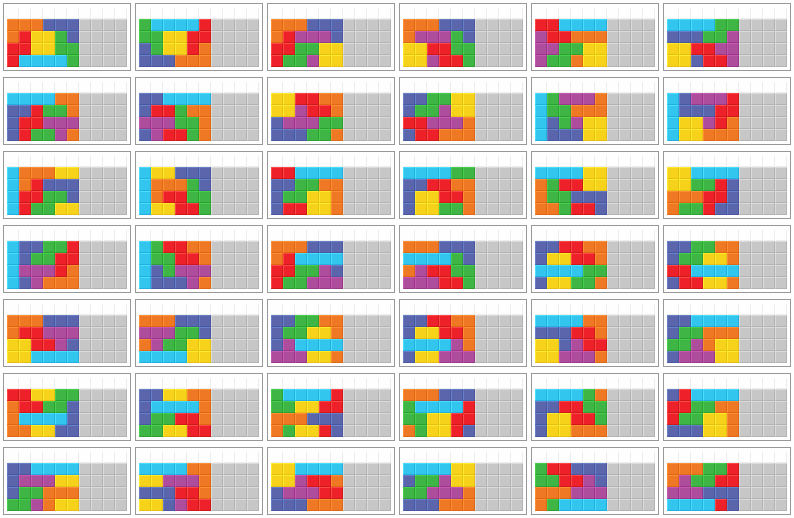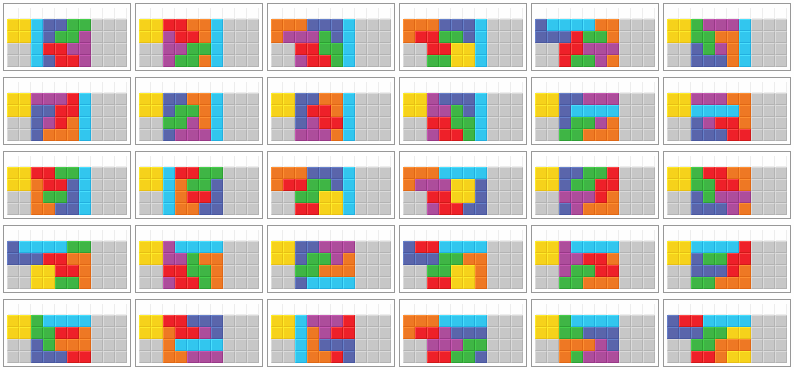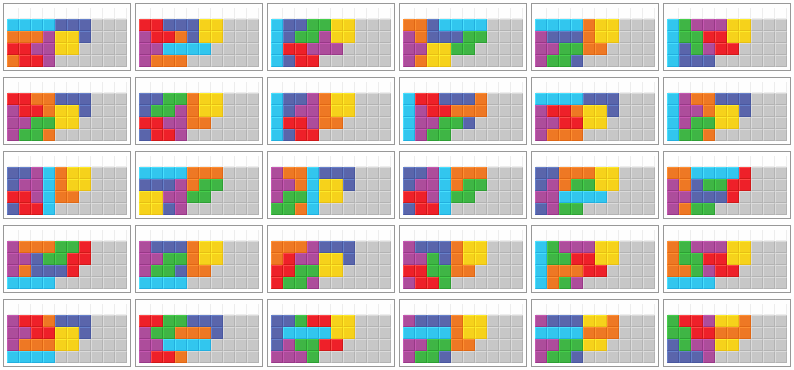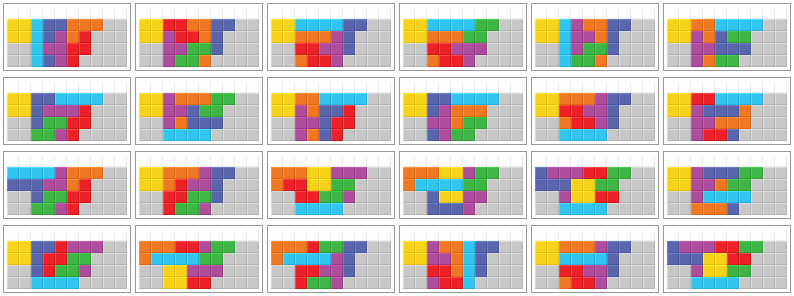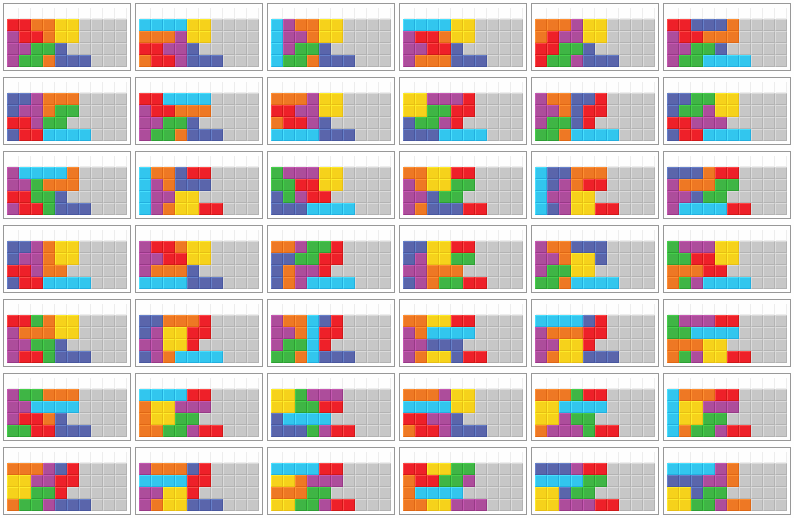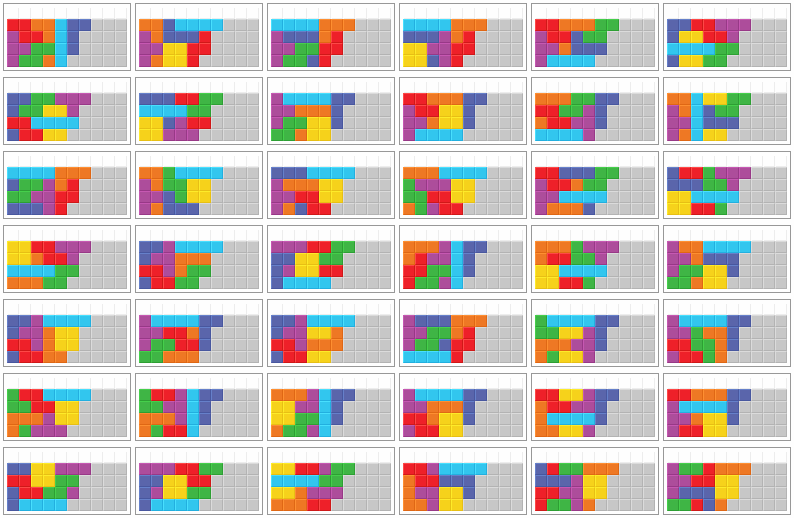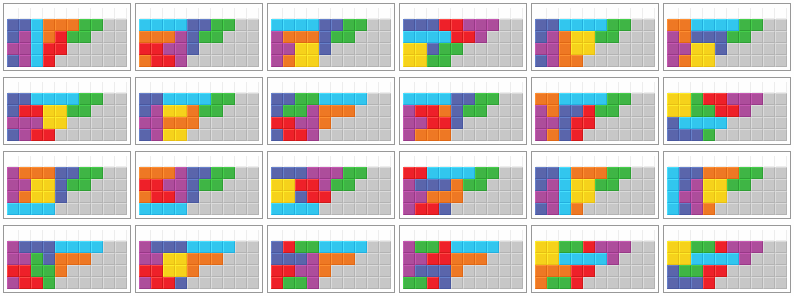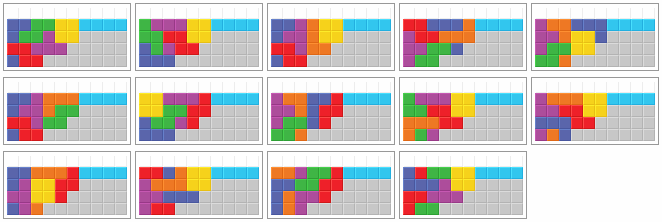From Hard Drop Tetris Wiki
Placing the 3rd bag (2nd PC)
This article is a more complete version of the Placing the 3rd bag (2nd PC) section from the Perfect Clear Opener article. We had assumed that the first Perfect Clear was successful and that we have already placed the remaining 4 pieces of the second bag in a way that gives a good starting position for placing the third bag in order to attain the second Perfect Clear. The remaining 4 pieces from the second bag create the grey blocks in the following pictures and they match one of those 4 categories:
- T piece, either L or J piece: In this case, it's best to place the second T piece vertically. If you do so, then you'll have to make an even number of L, J and vertical T placements in the third bag to achieve the PC which usually means to use both L and J, and place the third T piece horizontally (and deny odd line clears).
- no T piece, both L and J piece: This is also a pretty nice case. Again, in order to achieve the PC you'll have to make an even number of L, J and vertical T placements in the third bag. Unfortunately, if the T piece is used from third bag, then you'll have to apply one of those odd line clears.
- no T piece, either L or J piece: Not so nice. You'll have to make an odd number of L, J and vertical T placements in the third bag to achieve the PC. This means that you always have to place the third T piece and make an odd line clear. If you place the third T piece horizontally, then you'll have to avoid placing either L or J piece.
- no T piece, neither L or J piece: Not so nice, majorly because you have barely enough L and J pieces to fill out the corners. On the bright side, you'll have to make an even number of L, J and vertical T placements.
Now, let's have a look at how the third bag can be placed to achieve the second PC (after 20 placed pieces resp. 4 further lines cleared after first PC), depending on how the playfield looks like before the third bag is placed (the grey blocks originate from the remaining pieces of the second bag). In the following, we'll use the term "redundant" for a solution which only works for bags where another (non-redundant) solution also works. The redundant solution may still be better for certain bags, e.g. it may be easier spottable, require less softdrops or result in a nice combo or Double before the PC. So redundant doesn't mean worse necessarily. From time to time, we'll also use the term "intact" respectively "non-broken" solution which means that no piece is split in 2 parts in the corresponding picture. This requires the correct amount of T pieces to be used (T piece is used if and only if there is a parity imbalance among the grey blocks).
T piece placed (either L piece or J piece)
Every bag can be stacked in at least one of the following 12 ways. Pictures 4, 10 and 11 show redundant solutions. The solution shown in picture 12 has by far the lowest success rate from this selection but it may work with bag orders where the others will fail. When starting with L, J and either S or Z, one can immediately clear the 2 rows in the middle, too (similar to picture 11).
Every bag can be stacked in at least one of the following 12 ways. Pictures 3, 4, 6, 7 and 8 show redundant solutions. Not every intact solution is shown. Again, the solution shown in picture 12 has by far the lowest success rate from this selection. Note that the I piece can be spun in the bottom row (like in picture 2) without placing any additional pieces. While this is not possible in the mirrored field, one of the shown solutions will always work there. More precisely, pictures 2, 4 and 6 show redundant solutions for the mirrored playfield.
Every bag can be stacked in at least one of the following 18 ways. Pictures 6, 8, 12, 13 and 15 show redundant solutions. Not every intact solution is shown (there are other ways to stack those 3x3 block minus one corner in pictures 11 and 12).
99.8 % of all bags (5028 out of 5040) can be stacked in at least one of the following 18 ways. Pictures 4 to 6, 9, 10, and 13 to 16 show redundant solutions. Not every intact solution is shown.
Every bag can be stacked in at least one of the following 12 ways. Pictures 7 to 9, 11 and 12 show redundant solutions.
Every bag can be stacked in at least one of the following 18 ways. Pictures 7 to 9 and 11 to 18 show redundant solutions.
99.6 % of all bags (5018 out of 5040) can be stacked in at least one of the following 12 ways. Pictures 3 to 5 and 8 show redundant solutions. Not every intact solution is shown.
Every bag can be stacked in at least one of the following 18 ways. Pictures 3, 5, 7, 11, 13 and 15 show redundant solutions. Not every intact solution is shown.
Every bag can be stacked in at least one of the following 12 ways. Pictures 1 and 10 to 12 show redundant solutions; only solutions 2 and 3 are needed to pull off a PC 100 % of the time (same is true for the pair 1 and 3)!
Every bag can be stacked in at least one of the following 12 ways. Pictures 3 to 12 show redundant solutions; only solutions 1 and 2 are needed to pull off a PC 100 % of the time!
Every bag can be stacked in at least one of the following 12 ways. Pictures 2, 4 to 6 and 10 to 12 show redundant solutions. One intact solution is not shown (similar to picture 7, just with JZ and LO blocks flipped).
Both L piece and J piece placed (no T piece)
Every bag can be stacked in at least one of the following 18 ways. Pictures 9, 10, 13, 14 and 18 show redundant solutions.
Every bag except LTOJZIS and TLOJZIS can be stacked in at least one of the following 18 ways. Pictures 3 and 10 to 14 show redundant solutions.
Every bag can be stacked in at least one of the following 18 ways. Pictures 4, 7 to 9 and 15 to 17 show redundant solutions.
Every bag can be stacked in at least one of the following 18 ways. Pictures 7 to 11 show redundant solutions. The solution shown in picture 18 has the lowest success rate from this selection but it may work with bag orders where the others will fail.
Every bag can be stacked in at least one of the following 24 ways. Pictures 5, 6, 10, 12, 15 to 17, 21 and 22 show redundant solutions.
Every bag can be stacked in at least one of the following 42 ways. Pictures 9, 10 and 29 to 34 show redundant solutions (and from some pairs you need to utilize only one solution which makes 2, 4, 14, 38 redundant, too). Unfortunately, there isn't any solution with a very high success rate.
Every bag can be stacked in at least one of the following 18 ways. Pictures 3 and 9 to 12 show redundant solutions.
96.0 % of all bags (4840 out of 5040) can be stacked in at least one of the following 18 ways. Pictures 1, 6 to 8, 13 and 14 show redundant solutions. The last 2 solutions only work in very few cases.
Every bag except SLJTZOI and LSJTZOI can be stacked in at least one of the following 30 ways. Pictures 7, 11 to 15 and 19 show redundant solutions.
Every bag can be stacked in at least one of the following 18 ways. Pictures 3, 4 and 7 to 9 show redundant solutions.
Either L piece or J piece placed (no T piece)
94.2 % of all bags (4748 out of 5040) can be stacked in at least one of the following 12 ways. Pictures 3 and 6 show redundant solutions.
91.0 % of all bags (4588 out of 5040) can be stacked in at least one of the following 12 ways. Pictures 7 to 10 show redundant solutions.
80 % of all bags (4032 out of 5040) can be stacked in at least one of the following 5 ways. Pictures 4 and 5 show redundant solutions. At least one solution will always work when T piece comes first in bag.
98.3 % of all bags (4954 out of 5040) can be stacked in at least one of the following 30 ways. Pictures 2, 3, 7, 8, and 13 to 15 show redundant solutions. The last 5 solutions only work in a few cases.
97.9 % of all bags (4934 out of 5040) can be stacked in at least one of the following 30 ways. Pictures 5, 8 and 9 show redundant solutions. Solutions in bottom row have a relatively low success rate.
94.9 % of all bags (4784 out of 5040) can be stacked in at least one of the following 42 ways. Pictures 11, 12, 16, 17, 20, 23 and 25 show redundant solutions. Solutions from the 3 middle rows have a rather low success rate and solutions from the 2 bottom rows have a very low success rate. The success rate for the mirrored setup is slightly higher because more I spins work there. 95.1 % of all bags (4792 out of 5040) can be stacked in at least one of the shown ways in the mirrored playfield whereas pictures 1, 11, 12, 16, 17, 20, 26, 36 and 38 are redundant solutions there.
92.9 % of all bags (4682 out of 5040) can be stacked in at least one of the following 12 ways. Pictures 9 to 12 show redundant solutions.
92.5 % of all bags (4662 out of 5040) can be stacked in at least one of the following 42 ways. Pictures 5, 11 to 14, 18, 20 22, 25 and 26 show redundant solutions. The solutions from the bottom row have very low success rates.
91.2 % of all bags (4596 out of 5040) can be stacked in at least one of the following 18 ways. Pictures 7, 9, 13 and 15 show redundant solutions.
84.1 % of all bags (4240 out of 5040) can be stacked in at least one of the following 18 ways. Pictures 6, 8 to 10 and 14 to 18 show redundant solutions.
90.6 % of all bags (4566 out of 5040) can be stacked in at least one of the following 14 ways. Pictures 7, 11 and 14 show redundant solutions. All existing solutions for this setup are shown.
81.6 % of all bags (4112 out of 5040) can be stacked in at least one of the following 12 ways. Pictures 2, 5 and 9 show redundant solutions. All solutions but one are shown for this setup.
Neither L piece nor J piece placed (no T piece)
94.0 % of all bags (4736 out of 5040) can be stacked in at least one of the following 10 ways. Pictures 6 to 9 show redundant solutions. No further solution exists.
98.6 % of all bags (4968 out of 5040) can be stacked in at least one of the following 18 ways. Pictures 8, 9 and 12 show redundant solutions. The last 2 solutions have very low success rates.















